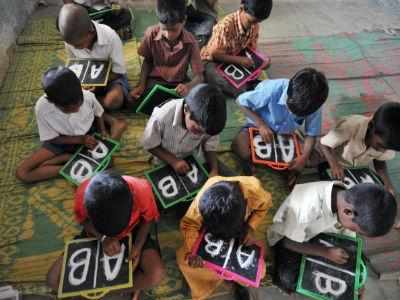
By Eduardo Faleiro 8 May 2019
On July 2016, the State Government constituted a Committee on Education to study the system of grants and financial support to Government and Government aided primary schools and to recommend measures to improve their overall efficiency. The Committee submitted its report last January. It has not been made public.
Goa has made significant progress in the field of education over the last 50 years. This is mainly due to Government aided and private institutions. Government schools themselves are in an appalling condition. Attendance at several Government primary schools which I visited over the last few years was almost 100 percent but in the circumstances in which most of them function, there is not much learning to be done. Four classes are often taught simultaneously in one classroom and in some cases eight classes in two languages. There are no black boards or they are not repaired, rice bags for the mid-day meal, discarded furniture, school records, etc are all bundled together in the same classroom along with the children. The students in Government schools are as bright and intelligent as their counterparts in private schools. What is lacking is the minimum infrastructure. As a result all those who can afford, enrol their children in private schools. The children in Government primary schools come from the poorer sections of society and their parents are often illiterate. These students require special attention but on the contrary they get no attention at all. Government primary schools have suffered from what might be called a “social attention deficit”, a sheer lack of attention and concern by the community at large including policymakers at all levels.
The Fundamental Right to Education for all children up to the age of 14 years is enshrined in our Constitution. The State Government must provide the required facilities to the students so that they can exercise this Fundamental Right. “Free Education” means not merely free from tuition fees but also adequate classrooms and teachers, free uniforms, text books and other educational material. Inequalities in education will be accentuated in the Computer Age. The dangerous “digital divide” can only be prevented if necessary steps are taken right now. The ideal is the “Common School System” with quality Government schools known as “neighbourhood schools” in every locality where all children irrespective of social class or religious affiliation will go. This is the system prevailing in Scandinavia and other educationally advanced countries. This approach was also endorsed by the Kothari Commission on Education which stated, “If our educational system is to become a powerful instrument of national development in general and social and national integration in particular, we must move towards the goal of a ‘Common School System’ of public education”.
UNESCO and leading educationalists across the world agree that the use of native languages in early childhood education enhances self confidence and academic performance. In the 17th century, the colonial Government felt necessary to suppress the languages of Goa in order to preserve its rule. In 1684, a decree (alvara) of the Viceroy directed that within 3 years, Goans should abandon the use of local languages and take to the use of Portuguese. A royal decree, dated March 16, 1687 affirms “for reasons of political expediency including the preservation of Portuguese India the decree (of the Viceroy) is approved”. Portuguese orientalist Cunha Rivara, Jesuit historian Delio Mendonca and other historians agree that the ban on local languages was recommended by the religious orders and that they benefitted from it. Pope John Paul II at the Millennium Mass in the Vatican issued a comprehensive apology for 2000 years of blunders by functionaries of the Roman Catholic Church including, “contempt for the cultures and religious traditions” of different ethnic groups . He pleaded for a future that would not repeat those mistakes. “Never again” he said.
Cultural identity contributes to people’s sense of belonging and overall well-being. Language is a central component of culture. People and nations who have flourished always promoted their language in their society. In Goa, the medium of instruction at primary level should be either Konkani or Marathi. Konkani is the official language of Goa and Marathi is and has always been the literary language of a large segment of our population. An essential prerequisite in this regard is that schools should be equipped with qualified manpower and text books should be revised to make elementary education a rewarding and enjoyable experience for the children.
It is incorrect to say that studying at the primary level in the local language impairs academic performance. During the colonial rule, many children would study at Marathi primary schools and then enrol themselves at the Portuguese Lyceum. They performed as well as their counterparts who did their entire education through the Portuguese medium. Many of them went on to become senior advocates and judges at the Supreme Court of Lisbon and distinguished themselves as University professors and in other fields of activity in Portugal and elsewhere in the world.
Universal literacy and quality education is a must. Government must formulate with a sense of urgency a comprehensive strategy and allot sufficient resources to improve the quality of education in Goa and to achieve a similar level of educational facilities and standards at all primary schools.
